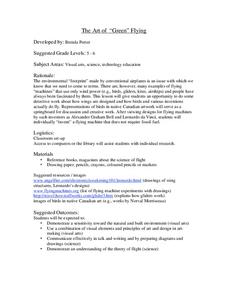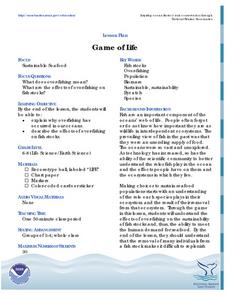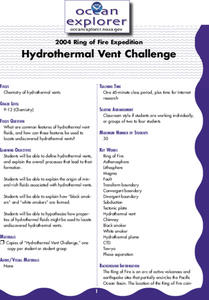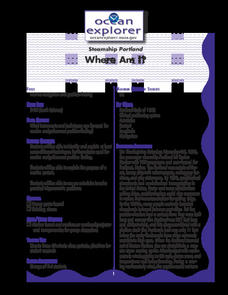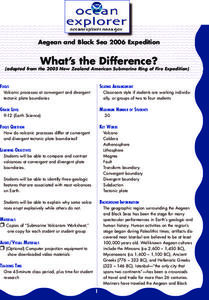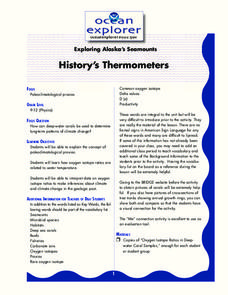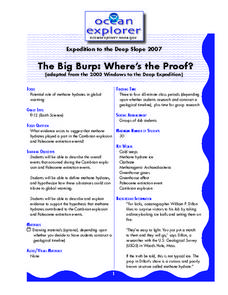Curated OER
Start at the Very Beginning
Students explore ocean ecosystems. In this cross curriculum art and oceans lesson, students create a collage featuring three-finger algae using sand paper, tissue paper, and construction paper.
Curated OER
The Art of "Green" Flying
Students create an airship that doesn't use fossil fuel. In this flying lesson, students research different types of flying machines that only use wind power. They discuss invention designs by Alexander Graham Bell and Leonardo Da Vinci...
Curated OER
Game of Life
By playing this game, students discover what happens to a fish stock when large amounts disappear.
Curated OER
Message in the Bottles
High schoolers identify the three realms of the Arctic Ocean, and describe the relationships among these realms. They explain the relationships between gross primary productivity, net primary productivity, and respiration.
Curated OER
The Galapagos Spreading Center
High schoolers explore the basic concept of seafloor spreading. They describe the processes involved in creating new seafloor at a mid-ocean ridge. They investigate the Galapagos Spreading Center system.
Curated OER
It's Going to Blow Up!
Students discover the major characteristics of volcanoes on the Pacific Ring of Fire. They describe the processes that produce the "Submarine Ring of Fire." students explain the factors that contribute to explosive volcanic eruptions.
Curated OER
The Good, The Bad and The Arctic
Students examine the impact of a major climate change in the Arctic Ocean on the rest of the world. They use the Internet to research the Arctic region and the wildlife that lives there.
Curated OER
The Volcano Factory
Students examine the process of tectonic plates and why the Mariana Arc is active with volcanoes. They create a model of the Mariana Arc out of clay.
Curated OER
Hydrothermal Vent Challenge
Students discover common features of hydrothermal vent fluids. They use this knowledge to locate possible undiscovered hydrothermal vents on the ocean floor.
Curated OER
Friendly Volcanoes
Students discuss the benefits of volcanic activity on marine life. They explain the process of tectonic plates.
Curated OER
What's Eating Titanic?
Learners, in groups, research the bio deterioration of the Titanic. They write a report focusing on the rusting of the Titanic and estimate the amount of time it will take for the Titanic's bow section to completely dissolve.
Curated OER
Steamship Portland: Where's the Energy?
Students examine how steamships operate. They describe the necessary energy conversions. They construct a model paddlewheel ship. They use rubber bands as examples of potential and kinetic energy as they unwind and set the models in motion.
Curated OER
Where Am I?
Sudents examine the types of instruments that can be used for marine navigation and position-finding. They practice using an astrolabe to solve trigonometric problems.
Curated OER
X-Storms
Students compare and contrast 3 types of extreme storms. They obtain real-time and historical meteorological data regarding 2 specific storms and then analyze the data to determine what type of storm each was.
Curated OER
Hot Food
High schoolers compare and contrast photosynthesis and chemosynthesis as processes that provide energy to biological communities. They investigate the energy content of hydrocarbons used in coral communities.
Curated OER
Do You Have a Sinking Feeling
High schoolers determine how marine archaeologists use historical and archaeological data to draw inferences about shipwrecks. Students plot the position of a shipwrecked vessel, and draw inferences about the shipwreck from artifacts...
Curated OER
What's the Difference?
Students investigate volcanic processes at convergent and divergent
tectonic plate boundaries. They read and analyze diagrams, complete a worksheet, and write an essay.
Curated OER
I Robot, Can Do That
Students examine how underwater robots can be used to assist scientific explorations. They read and discuss an article, conduct Internet research, complete a worksheet, and present an oral report.
Curated OER
Tracking Narwhals in Greenland The Ocean Unicorn
Learners study the ecology, habitats, geographic range and feeding habits of narwhals. They determine at least three reasons for the decline in the narwhal populations and complete the accompanying worksheets.
Curated OER
Frozen Out
Middle schoolers investigate how climate changes affect top predators in Arctic marine ecosystems. Students complete a worksheet and write a report based on their responses to a scientific paper.
Curated OER
The Good, The Bad, and the Arctic
Students investigate the social, economic and environmental consequences that might result from Arctic climate change. Students identify and discuss at least three consequences.
Curated OER
Journey To the Unkown
Students explore the ocean rift habitat off the Galapagos through an audio expedition, Internet research on deep sea animals, an explorer game and simulation of the exploration of the deep sea bottom. They focus on the actual NOAA...
Curated OER
History's Thermometers
Learners explain the concept of paleoclimatological proxies. In this oxygen isotope lesson plan, students interpret data and make inferences about climate changes in the geologic past.
Curated OER
The Big Burp: Where's the Proof?
Students research the evidence for prehistorically formed methane hydrates contributing to global warming. In this climate change lesson, students work in groups to research methane hydrates, global warming, The Cambrian Explosion, and...



